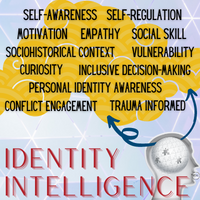3 Ways Identity Intelligence Helps Leaders Build Trust Quickly
These days, building trust feels like a monumental task, especially with our environment pushing so many into isolation. The good news is that a leader that works to develop their Identity Intelligence™ is better primed than most to build a powerful and trusting team.
In 1995, a study by Mayer, Davis, & Schoorman defined trust as “the willingness of a party to be vulnerable to the actions of another party based on the expectation that the other will perform a particular action important to the trustor, irrespective of the ability to monitor or control that party” and ability, integrity, and benevolence as the most critical factors for trust. It is, decidedly, not the same as cooperation, confidence, or predictability of or with another party. From this study, a number of thought leaders have pulled out traits that align with this model of trust. We’ll focus in on consistency, commitment, and caring.
After working with leaders across industries and across the United States, and through our experience as human resources experts, InspirED Solutions crafted a framework that supports leaders in being not only effective, but also inclusive and equitable. We call it our Inclusive and Equitable Leadership Framework. We believe that when a leader focuses on wellness, Identity Intelligence™, systems thinking, culture management, and professionalism that is not rooted in controlling others or suppressing cultural difference, they become able to lead their people to remarkable outcomes. In this musing, we’ll explore three traits of Identity Intelligence™ from our Inclusive & Equitable Leadership Framework that we believe can be catalysts for building trust with your team:
1. Show You Are Consistent by Being Self-Aware
2. Show You Are Committed by Using Inclusive Decision-Making
3. Show You Are Caring by Demonstrating Curiosity
Show You Are Consistent by Being Self-Aware
A few years back, authenticity was among the most popular leadership topics. At the time, Millennials were flooding the job market and authenticity emerged as a resonant theme for the generation that spread across the professional world. Under the 12 traits of the Identity Intelligence™ element of our Inclusive & Equitable Leadership Framework™, we name Self-Awareness as the first trait. So much of Identity Intelligence™ is knowing yourself and your impact on others. Do you understand your emotions? Do you know your strengths and weaknesses? What drives you? What are your values? What are your goals as a leader?
When you know yourself well, when you have strong Self-Awareness, you are able to show up consistently in the same way because you are not molding yourself to someone else’s idea of who you should be. You are confident in your choices because they are rooted in your values. You have a realistic view of yourself, your capabilities, and your limitations and embrace them, which leads to you noticing and strengths of others and inviting them into your aspirations. And because you can stand strong in knowing who you are, you not only are okay with constructive, critical criticism, you actively seek criticism from others.
When it comes to building trust, you being consistently you is so important. How can you expect someone to trust you if your core beliefs continually shift? The same is true if you don’t seem to understand the impact you have on others. Who is going to follow a leader whose ego is so fragile they cannot receive criticism?
Show Your Commitment by Using Inclusive Decision-Making
If there’s one thing you’ll hear constantly from those of us who work in the world of talent management and leadership development, it’s the fact that the world is and has changed dramatically from what was true even 10 years ago. With more generations simultaneously existing in our workforce than ever before, and technological innovations making connecting across communities easier than ever, the ability to work across lines of difference is more important than ever. The old-school authoritarian approach simply is ineffective in today’s context. Even the decisions made with the best of intentions, absent inclusive decision-making, can not only be harmful, but may disrupt your culture so much as to bring productivity to a standstill. This is especially true for professional environments.
Inclusive Decision-Making, as defined in the Identity Intelligence™ element of our Inclusive and Equitable Leadership Framework™, means that a leader ensures that those most impacted by decisions have the power and access to influence decisions. Sometimes that might be the people who are charged with carrying out the decision – they likely have more context for how to make that thing happen more smoothly (or may be able to spot potential roadblocks which help you have a realistic expectation for success and progress).
When a leader is strong in inclusive decision-making, they are comfortable transferring and relinquishing their authority and power when it makes sense. They trust the people they lead and work with and always have a clear rationale for the decisions they make. As a result, they intentionally share rationale for decisions and welcome questions – mostly because they have already done the work to ensure that they weren’t the only person making the decision.
Operating as a leader with inclusive decision-making demonstrates a commitment to the people you are serving, whether those are the people you lead, your constituents, or stakeholders. That commitment is integral to building trust. How do you trust someone that does not demonstrate any level of commitment to the things you care about or the things that impact you? Let’s say you must reduce your budget. How will they know that cutting roles was the best option if they were never invited to be a part of the decision-making process? To be very clear, it is the leader’s role to make those tough decisions and it is never appropriate to shift responsibility to those who are neither positioned nor compensated for making those decisions. At the same time, because those decisions impact people, an effective and inclusive and trustworthy leader will be transparent about what is happening and present the options they’ve considered as well as the rationale behind why they’re leaning the way they are; they will also provide space for folks to process and suggest alternatives before coming to a final decision.
Show Your Consideration by Demonstrating Curiosity
Sometimes, as leaders become more expert at what they do, and their time becomes increasingly limited, it can be difficult to maintain a disposition of curiosity. Because we have seen things happen so many times, with the same cycle and pattern, it can be easy to simply assume you know what you need to know. And as a result, we become less curious about people and situations. But here’s the thing: there’s always something we don’t know. There’s always more to learn. There’s always nuance. Curiosity is another of the traits we name for Identity Intelligence™. It means having genuine interest and a sense of wonder about other people, their stories, and how they and the world are connected.
Leaders who have developed the disposition of curiosity listen deeply and actively to others, truly seeking to understand and internalize information and experiences. They ask important questions, without being invasive, which creates a safer space for those who are being asked to be vulnerable and share sometimes incredibly personal experiences or thoughts. Their wonder is firmly rooted in a desire to understand, rather than any critique they may have of someone or their actions, or interrogating what people are telling them. There is a time for all of that, but when you’re building relationships or people are being vulnerable is not that time.
Having genuine curiosity for others is critical in building trust because it operates as a two-way street. As you learn people more, doubt can diminish and your confidence in them may grow as well. The same is true for those people towards you. What’s more, the humility and consideration that curiosity requires enables people to feel that they can tell you more. Would you tell your leader bad news if you knew they’d simply interrogate you about that bad news as if it’s your fault? How can anyone expect to trust someone that they do not believe is considerate? Someone that does not consider their feelings, their thoughts, their ideas? Anyone too confident in their own knowledge will likely miss key information, which is often the reason cultural dynamics seem to erupt. The truth is that they rarely do – it’s been simmering for a while and it’s only then that the leader has taken the time to notice. Being curious about your people and their experiences can make your “open door policy” real.
THE LAST WORD
The point of it all is that building your Identity Intelligence™ naturally builds trust, regardless of which traits you choose to give your focus. But it’s a complex competency, not a straightforward skill, and it isn’t something anyone should ever expect to become perfect with – it takes ongoing work, reflection, and development. InspirED Solutions works with leaders specifically to develop the traits that matter most to them and their leadership. But even if you do not decide to join our InspirED Leadership Coaching Program, we highly encourage you to work with a coach of some sort to grow in the traits of self-awareness, inclusive decision-making, and curiosity. You can also purchase our Inclusive and Equitable Leadership Framework Reflection Guide. In the meantime, we’d love to hear from you! Please share below in the comments: what matters most to YOU when giving the gift of your trust?










